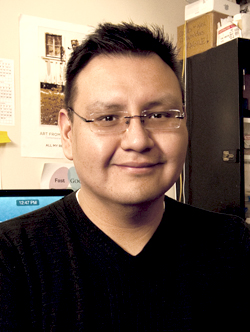 Every six months, Isaac Iron Shell, Sr.
Every six months, Isaac Iron Shell, Sr.
would take his cattle to the stock market and sell what he
could. Shortly thereafter, his wife, Susan Standing Bull-Iron
Shell would sit with her six children and go through the
Sears-Roebuck and JC Penny catalogs and they would pick out dresses,
shoes and coats for the coming six months. Like clockwork, my
grandparents provided for their five daughters and son in
preparation for Christmas and the school year at the St. Francis
Mission on the Rosebud reservation.
My mother, aunts and uncle were among
the more fortunate and privileged on the reservation in those
days, both parents worked hard through the year, farming, ranching,
canning, drying and providing for the prosperity of their
children and grandchildren.
The school year, however, was fraught
with its own difficulties. My grandfather knew the stories from his
relatives about how the Jesuit priests and nuns would abuse children,
emotionally, physically and sexually. The story my mother told
me was that while both my grandparents were devout Catholics, they
remained true to their traditions and practiced Wolakota in
secret. Living that dual existence also taught them to understand the
darker aspects of the Black Robes and work within that particular
system of oppression. Grandfather Iron Shell became a senior
catechist in his younger days, proclaiming the Word of Christ,
facilitating liturgy and playing the fiddle and organ for the monthly
Mass in Upper Cut Meat Community.
He did these things, according to my
mother, to ensure his children would not be subject to the
physical and sexual abuse of the missionaries. It was quid pro quo
with no written agreement, only a tacit understanding and faith that
whatever humanity remained in the predators at the mission would
honor the covenant he made with them to leave his daughters alone.
While removed from the darker corners of the boarding school
experience, my mother and her sisters and brother still received
their fair share of emotional and psychological abuse. In one
instance that haunted her until the early 1990s, my mother was forced
to watch as a bride of Christ incinerated kittens in front of
her class to, as my mother put it, “remind us who was in charge and
how they didn’t fear anyone.”
It often puzzled me how, despite the
stark realities of reservation life under a de facto theocracy, my
mother could move forward in life. In the oppression Olympics, it
could be argued that her privilege exempted her from the truly
devastating effects of physical and sexual abuse and to an extent,
there’s some truth to that. For a time, like my father, she sought
a solution to her trauma in alcohol. But when it came to her own
children, she put aside her addiction and remained dry throughout the
1980s and in the early 1990s, she began working on her recovery.
That is when she told me that not
despite, but because, of her experiences in boarding school (the
worst of which, she never spoke about), she was able to forgive. She
forgave the priests and nuns who inflicted what damage they
could on her and her siblings. When I asked if she had any objection
to me going through Catholic confirmation classes in high school, she
said simply, “that’s my anger, don’t make it yours.” She
remained ever mindful of the benefits of the advantages of her
education.
Because of her education, she traveled
to the Bay Area in California during the Summer of Love, she
continued her education in law enforcement as a matron and dispatcher
and ultimately, worked for our tribal college, Sinte Gleska
University, as an Adult Basic Education coordinator who taught her
contemporaries how to read, write and do basic math.
Her education also gave her a love of
learning and adapting to the changing technology of the
world. When the first Nintendo gaming console came to the
reservation, she quickly mastered the two games we had.
Professionally, she was relied on to create data management
systems for the tribal programs she worked for and instilled this
desire to always learn more about the world around us in her own
children and grandchildren.
As Native children in the Twin Cities,
across Minnesota and throughout the nations prepare for school,
it’s incumbent on our generations to carry forward the history, the
lessons and the benefits of our own education, free from anger,
prejudice and resentment; rooted in the language, tradition and
culture of our ancestors.
As Larry Stillday said, “The young
ones will never know there was a loss. We provided a place for
them; this is where they are from. Quit teaching that they lost
something. Our youth will pick it up; we just have to give them
the opportunity. This has been nothing but learning, all will go away
with something, all will go away as better people.”






